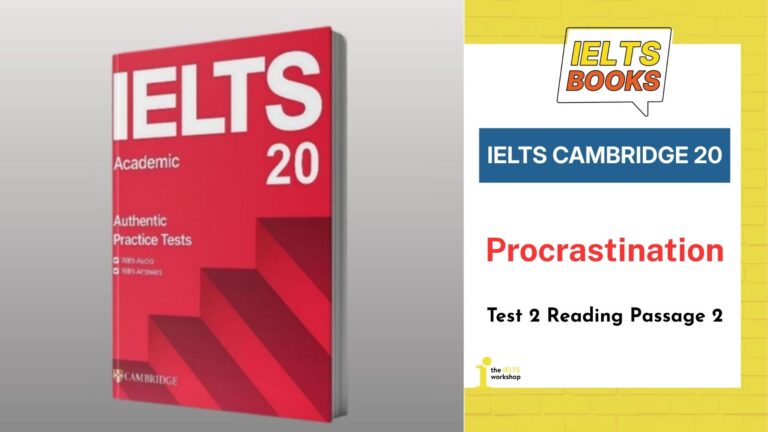Nhiều bạn vẫn còn loay hoay vì dạng bài Reading đòi hỏi nhiều kĩ năng và nặng kiến thức học thuật. Đừng lo, ở bài viết này The IELTS Workshop mang đến cho các bạn đáp án, bản dịch và phân tích chi tiết IELTS Cambridge 20 Test 2 Reading Passage 2: Procrastination giúp bạn nâng cao điểm số một cách hiệu quả.
Đáp án IELTS Cambridge 20 Test 2 Reading Passage 2
| Câu hỏi | Đáp án |
| 14 | B |
| 15 | F |
| 16 | B |
| 17 | Laziness |
| 18 | Anxious |
| 19 | Threats |
| 20 | Exams |
| 21 | Perfectionists |
| 22 | Guilt |
| 23 | A, C |
| 24 | A, C |
| 25 | A, E |
| 26 | A, E |
Phân tích chi tiết đáp án IELTS Cambridge 20 Test 2 Reading Passage 2
Câu 14 – Đáp án: B
Câu hỏi: mention of false assumptions about why people procrastinate (đề cập đến những giả định sai lầm về lý do tại sao mọi người trì hoãn)
Vị trí: Đoạn B
Transcript: Contrary to popular belief, procrastination is not due to laziness or poor time management.
Phân tích: Câu hỏi đề cập đến những giả định sai lầm về lý do trì hoãn. Đoạn B bắt đầu bằng cách bác bỏ quan niệm phổ biến (“Contrary to popular belief”) rằng sự trì hoãn là do lười biếng (“laziness”) hoặc quản lý thời gian kém (“poor time management”).
Câu 15 – Đáp án: F
Câu hỏi: reference to the realisation that others also procrastinate (tham chiếu đến việc nhận ra rằng những người khác cũng trì hoãn)
Vị trí: Đoạn F
Transcript: We should remind ourselves that we’re not the first person to procrastinate, nor the last.
Phân tích: Câu hỏi đề cập đến việc nhận ra người khác cũng trì hoãn. Đoạn F khuyên rằng chúng ta nên tự nhắc nhở bản thân rằng mình không phải là người đầu tiên hay cuối cùng trì hoãn, điều này chính là sự nhận thức rằng đây là một hành vi phổ biến.
Câu 16 – Đáp án: B
Câu hỏi: neurological evidence of a link between procrastination and emotion (bằng chứng thần kinh về mối liên hệ giữa sự trì hoãn và cảm xúc)
Vị trí: Đoạn B
Transcript: Research involving brain imaging has found that areas of the brain linked to detection of threats and emotion regulation are actually different in people who chronically procrastinate compared to those who don’t procrastinate frequently.
Phân tích: Câu hỏi yêu cầu bằng chứng thần kinh học (“Neurological evidence”) về mối liên hệ giữa trì hoãn và cảm xúc. Đoạn B trích dẫn nghiên cứu về hình ảnh não bộ (“brain imaging”) cho thấy sự khác biệt ở các vùng não liên quan đến việc phát hiện mối đe dọa (“threats”) và điều chỉnh cảm xúc (“emotion regulation”).
Câu 17 – Đáp án: laziness
Câu hỏi: Many people think that procrastination is the result of _____
(Nhiều người cho rằng sự trì hoãn là kết quả của _____)
Vị trí: Đoạn B
Transcript: Contrary to popular belief, procrastination is not due to laziness or poor time management.
Phân tích: Câu hỏi yêu cầu một nguyên nhân mà nhiều người thường nghĩ là lý do của sự trì hoãn. Đoạn văn nêu rõ quan niệm phổ biến cho rằng trì hoãn là do lười biếng (“laziness”) hoặc quản lý thời gian kém. “laziness” phù hợp với giới hạn một từ.
Câu 18 – Đáp án: anxious
Câu hỏi: The tasks we are most likely to put off are those that could damage our self-esteem or cause us to feel _____ when we think about them.
(Những nhiệm vụ mà chúng ta hay trì hoãn nhất là những nhiệm vụ có thể làm tổn hại đến lòng tự trọng của chúng ta hoặc khiến chúng ta cảm thấy _____ khi nghĩ về chúng.)
Vị trí: Đoạn B
Transcript: If just thinking about the task threatens our sense of self-worth or make us anxious, we will be more likely to put it off.
Phân tích: Câu hỏi đề cập đến những nhiệm vụ có thể làm chúng ta trì hoãn. Đoạn văn giải thích rằng những nhiệm vụ đe dọa lòng tự trọng hoặc khiến chúng ta cảm thấy lo lắng (“anxious”) là những nhiệm vụ chúng ta có nhiều khả năng trì hoãn nhất.
Câu 19 – Đáp án: threats
Câu hỏi: Research comparing chronic procrastinators with other people even found differences in the brain regions associated with regulating emotions and identifying _____ .
(Nghiên cứu so sánh những người hay trì hoãn với những người khác thậm chí còn phát hiện ra sự khác biệt ở các vùng não liên quan đến việc điều chỉnh cảm xúc và xác định _____.)
Vị trí: Đoạn B
Transcript: Research involving brain imaging has found that areas of the brain linked to detection of threats and emotion regulation are actually different…
Phân tích: Câu hỏi yêu cầu một yếu tố mà vùng não của người hay trì hoãn có sự khác biệt trong việc xác định, bên cạnh việc điều chỉnh cảm xúc. Đoạn văn chỉ ra đó là việc phát hiện các mối đe dọa (“detection of threats”).
Câu 20 – Đáp án: exams
Câu hỏi: Getting ready to take _____ might be a typical example of one such task.
(Chuẩn bị thực hiện _____ có thể là một ví dụ điển hình về một nhiệm vụ như vậy.)
Vị trí: Đoạn C
Transcript: Tasks that are emotionally loaded or difficult, such as preparing for exams, are prime candidates for procrastination.
Phân tích: Câu hỏi yêu cầu một ví dụ điển hình về một nhiệm vụ khó khăn và dễ gây trì hoãn. Đoạn văn đã đưa ra ví dụ cụ thể là việc chuẩn bị cho các kỳ thi (“preparing for exams”).
Câu 21 – Đáp án: perfectionists
Câu hỏi: People who are likely to procrastinate tend to be either _____ self-esteem or those with low self-esteem.
(Những người có xu hướng trì hoãn thường là những người có lòng tự trọng _____ hoặc có lòng tự trọng thấp.)
Vị trí: Đoạn C
Transcript: Another group of people who tend to procrastinate are perfectionists, who worry about their work will be judged harshly by others.
Phân tích: Câu hỏi đề cập đến hai nhóm người có xu hướng trì hoãn. Đoạn văn đã liệt kê nhóm người có lòng tự trọng thấp và nhóm thứ hai là những người cầu toàn (“perfectionists”).
Câu 22 – Đáp án: guilt
Câu hỏi: Procrastination is only a short-term measure for managing emotions. It’s often followed by a feeling of _____, which worsens our mood and leads to more procrastination.
(Trì hoãn chỉ là một biện pháp ngắn hạn để quản lý cảm xúc. Nó thường đi kèm với cảm giác _____, khiến tâm trạng chúng ta trở nên tồi tệ hơn và dẫn đến trì hoãn nhiều hơn.)
Vị trí: Đoạn C
Transcript: Afterwards, people tend to be left with a sense of guilt that not only increases their negative mood, but also reinforces their tendency to procrastinate.
Phân tích: Câu hỏi nói rằng sau khi trì hoãn, con người thường có một cảm giác tiêu cực. Đoạn văn xác nhận rằng sau khi trải qua việc “sửa chữa tâm trạng” tạm thời, con người có xu hướng bị bỏ lại với cảm giác tội lỗi (“a sense of guilt”).
Câu 23 & 24 – Đáp án: A, C
Tiếng Anh: Which TWO comparisons between employees who often procrastinate and those who do not are mentioned in the text?
A. Their salaries are lower.
B. The quality of their work is inferior.
C. They don’t keep their jobs for as long.
D. They don’t enjoy their working lives as much.
E. They have poorer relationships with colleagues.
Dịch câu hỏi: HAI sự so sánh nào giữa những nhân viên thường trì hoãn và những người không trì hoãn được đề cập trong văn bản?
A. Mức lương của họ thấp hơn.
B. Chất lượng công việc của họ kém hơn.
C. Họ không giữ được công việc lâu dài.
D. Họ không tận hưởng cuộc sống làm việc của mình nhiều như trước.
E. Họ có mối quan hệ kém hơn với đồng nghiệp.
Vị trí: Đoạn D
Transcript: In fact, in one US survey of over 22,000 employees, participants who said they regularly procrastinated had less annual income and less employment stability…
Phân tích: Đoạn văn chỉ rõ rằng những nhân viên thường xuyên trì hoãn có thu nhập hàng năm thấp hơn (A. Their salaries are lower) và sự ổn định công việc kém hơn (C. They don’t keep their jobs for as long). Bài đọc không đề cập đến chất lượng công việc, mức độ yêu thích công việc, hay mối quan hệ với đồng nghiệp của những người hay trì hoãn.
Câu 25 & 26 – Đáp án: A, E
Tiếng Anh: Which TWO recommendations for getting out of a cycle of procrastination does the writer give?
A. not judging ourselves harshly
B. setting ourselves manageable aims
C. rewarding ourselves for tasks achieved
D. prioritising tasks according to their importance
E. avoiding things that stop us concentrating on our tasks
Dịch câu hỏi: Tác giả đưa ra HAI lời khuyên nào để thoát khỏi vòng luẩn quẩn trì hoãn?
A. Không phán xét bản thân quá khắt khe
B. Đặt ra những mục tiêu có thể quản lý được
C. Tự thưởng cho bản thân khi hoàn thành nhiệm vụ
D. Ưu tiên các nhiệm vụ theo mức độ quan trọng
E. Tránh những điều khiến chúng ta mất tập trung vào công việc
Vị trí: Đoạn F
Transcript: We should admit that we feel bad, but not be overly critical of ourselves… There are a number of evidence-based strategies that can help us fend off distractions that can occupy our minds when we should be focusing on the things we should be getting on with.
Phân tích: Đoạn văn đưa ra hai lời khuyên: thứ nhất, không nên quá khắt khe với bản thân (A. Not judging ourselves harshly). Thứ hai, sử dụng các chiến lược để chống lại những phiền nhiễu (“fend off distractions”), tức là tránh những thứ khiến chúng ta mất tập trung (E. Avoiding things that stop us from concentrating on our tasks). Bài đọc không đề cập đến việc đặt ra mục tiêu có thể quản lý, tự thưởng cho bản thân, hay sắp xếp công việc theo mức độ ưu tiên.
Bản dịch chi tiết IELTS Cambridge 20 Test 2 Reading Passage 2
Procrastination
A. Procrastination is the habit of delaying a necessary task, usually by focusing on less urgent, more enjoyable, and easier activities instead. We all do it from time to time. We might be composing a message to a friend who we have to let down, or putting together an important report for college or work, we’re doing our best to avoid doing the job at hand, but deep down we know that we should just be getting on with it. Unfortunately, berating ourselves won’t stop us procrastinating again. In fact, it’s one of the worst things we can do. This matters because, as my research shows, procrastination doesn’t just waste time, but is actually linked to other problems, too.
Trì hoãn là thói quen hoãn lại một công việc cần thiết, thường bằng cách tập trung vào các hoạt động ít khẩn cấp hơn, thú vị hơn và dễ dàng hơn. Tất cả chúng ta đều thỉnh thoảng làm vậy. Có thể chúng ta đang soạn một tin nhắn cho một người bạn mà ta phải làm họ thất vọng, hoặc đang tổng hợp một báo cáo quan trọng cho trường học hoặc công việc, chúng ta đang cố gắng hết sức để tránh làm công việc trước mắt, nhưng sâu thẳm bên trong chúng ta biết rằng mình nên tiếp tục làm nó. Thật không may, việc trách mắng bản thân sẽ không ngăn chúng ta trì hoãn lần nữa. Thực tế, đó là một trong những điều tồi tệ nhất chúng ta có thể làm. Điều này quan trọng bởi vì, như nghiên cứu của tôi cho thấy, sự trì hoãn không chỉ lãng phí thời gian mà thực sự còn liên quan đến các vấn đề khác nữa.
Từ vựng cần nhớ:
- Procrastination /prəˌkræstɪˈneɪʃən/ (danh từ): Sự trì hoãn, thói quen trì hoãn
- Berate /bɪˈreɪt/ (động từ): Mắng mỏ, trách mắng
B. Contrary to popular belief, procrastination is not due to laziness or poor time management (Q17). Scientific studies suggest procrastination is, in fact, caused by poor mood management. (Q14) This makes sense if we consider that people are more likely to put off starting or completing tasks that they are really not keen to do. If just thinking about the task threatens our sense of self-worth or makes us anxious, we will be more likely to put it off (Q18). Research involving brain imaging has found that areas of the brain linked to detection of threats and emotion regulation are actually different in people who chronically procrastinate compared to those who don’t procrastinate frequently. (Q16, Q19)
Trái với quan niệm phổ biến, sự trì hoãn không phải do lười biếng hay quản lý thời gian kém. Các nghiên cứu khoa học cho thấy sự trì hoãn thực chất là do quản lý tâm trạng kém. Điều này có lý nếu chúng ta xem xét rằng mọi người có nhiều khả năng trì hoãn việc bắt đầu hoặc hoàn thành các nhiệm vụ mà họ thực sự không muốn làm. Nếu chỉ nghĩ về nhiệm vụ đó thôi đã đe dọa đến cảm giác giá trị bản thân hoặc làm chúng ta lo lắng, chúng ta sẽ có nhiều khả năng trì hoãn nó hơn. Nghiên cứu sử dụng hình ảnh não bộ đã phát hiện ra rằng các vùng não liên quan đến việc phát hiện mối đe dọa và điều chỉnh cảm xúc thực sự khác biệt ở những người trì hoãn kinh niên so với những người không thường xuyên trì hoãn.
Từ vựng cần nhớ:
- Chronically /ˈkrɒnɪkli/ (trạng từ): Một cách kinh niên, mãn tính
C. Tasks that are emotionally loaded or difficult, such as preparing for exams, are prime candidates for procrastination. (Q20) People with low self-esteem are more likely to procrastinate. Another group of people who tend to procrastinate are perfectionists, who worry their work will be judged harshly by others. (Q21) We know that if we don’t finish that report or complete those home repairs, then what we did can’t be evaluated. When we avoid such tasks, we also avoid the negative emotions associated with them. This is rewarding, and it conditions us to use procrastination to repair our mood. If we engage in more enjoyable tasks instead, we get another mood boost. In the long run, however, procrastination isn’t an effective way of managing emotions. The ‘mood repair’ we experience is temporary. Afterwards, people tend to be left with a sense of guilt that not only increases their negative mood, but also reinforces their tendency to procrastinate. (Q22)
Các nhiệm vụ nặng về cảm xúc hoặc khó khăn, chẳng hạn như chuẩn bị cho kỳ thi, là những ứng cử viên hàng đầu cho sự trì hoãn. Những người có lòng tự trọng thấp có nhiều khả năng trì hoãn hơn. Một nhóm người khác cũng có xu hướng trì hoãn là những người cầu toàn, những người lo lắng công việc của họ sẽ bị người khác đánh giá khắt khe. Chúng ta biết rằng nếu không hoàn thành báo cáo đó hoặc không sửa chữa xong những hỏng hóc trong nhà, thì những gì chúng ta đã làm không thể bị đánh giá. Khi chúng ta tránh những nhiệm vụ như vậy, chúng ta cũng tránh được những cảm xúc tiêu cực liên quan đến chúng. Điều này mang lại cảm giác thỏa mãn và nó tập cho chúng ta thói quen sử dụng sự trì hoãn để cải thiện tâm trạng. Nếu thay vào đó chúng ta tham gia vào các nhiệm vụ thú vị hơn, chúng ta sẽ có thêm một cú hích tâm trạng. Tuy nhiên, về lâu dài, trì hoãn không phải là một cách hiệu quả để quản lý cảm xúc. Việc “cải thiện tâm trạng” mà chúng ta trải qua chỉ là tạm thời. Sau đó, mọi người có xu hướng bị bỏ lại với cảm giác tội lỗi không chỉ làm tăng tâm trạng tiêu cực mà còn củng cố thêm xu hướng trì hoãn của họ.
Từ vựng cần nhớ:
- Self-esteem /ˌsɛlf ɪˈstiːm/ (danh từ): Lòng tự trọng, sự tự tôn
- Perfectionist /pəˈfɛkʃənɪst/ (danh từ): Người cầu toàn
- Reinforce /ˌriːɪnˈfɔːs/ (động từ): Củng cố, làm cho mạnh thêm
D. So why is this such a problem? When most people think of the costs of procrastination, they think of the toll on productivity. For example, studies have shown that procrastination negatively impacts on student performance. But putting off reading textbooks and writing essays may affect other areas of students’ lives. In one study of over 3,000 German students over a six-month period, those who reported procrastinating over their university work were also more likely to engage in study-related misconduct, such as cheating and plagiarism. But the behaviour that procrastination was most closely linked with was using fraudulent excuses to get deadline extensions. Other research shows that employees on average spend almost a quarter of their workday procrastinating, and again this is linked with negative outcomes. In fact, in one US survey of over 22,000 employees, participants who said they regularly procrastinated had less annual income and less employment stability. (Q23, Q24) For every one-point increase on a measure of chronic procrastination, annual income decreased by US$15,000.
Vậy tại sao đây lại là một vấn đề lớn như vậy? Khi hầu hết mọi người nghĩ về cái giá của sự trì hoãn, họ nghĩ đến tổn thất về năng suất. Ví dụ, các nghiên cứu đã chỉ ra rằng sự trì hoãn tác động tiêu cực đến kết quả học tập của sinh viên. Nhưng việc trì hoãn đọc sách giáo khoa và viết luận có thể ảnh hưởng đến các lĩnh vực khác trong cuộc sống của sinh viên. Trong một nghiên cứu trên 3.000 sinh viên Đức trong khoảng thời gian sáu tháng, những người báo cáo rằng họ trì hoãn công việc ở trường đại học cũng có nhiều khả năng tham gia vào các hành vi sai trái liên quan đến học tập, chẳng hạn như gian lận và đạo văn. Nhưng hành vi mà sự trì hoãn có liên quan chặt chẽ nhất là sử dụng các lý do gian dối để xin gia hạn thời gian nộp bài. Nghiên cứu khác cho thấy nhân viên trung bình dành gần một phần tư ngày làm việc để trì hoãn, và điều này một lần nữa lại liên quan đến các kết quả tiêu cực. Trên thực tế, trong một cuộc khảo sát tại Hoa Kỳ với hơn 22.000 nhân viên, những người tham gia cho biết họ thường xuyên trì hoãn có thu nhập hàng năm thấp hơn và sự ổn định công việc kém hơn. Cứ mỗi một điểm tăng trên thang đo mức độ trì hoãn kinh niên, thu nhập hàng năm giảm 15.000 đô la Mỹ.
Từ vựng cần nhớ:
- Misconduct /ˌmɪsˈkɒndʌkt/ (danh từ): Hành vi sai trái, hành vi không đúng đắn
- Plagiarism /ˈpleɪdʒərɪzəm/ (danh từ): Sự đạo văn, hành vi ăn cắp ý tưởng
- Fraudulent /ˈfrɔːdʒələnt/ (tính từ): Gian lận, lừa đảo
E. Procrastination also correlates with serious health and well-being problems. A tendency to procrastinate is linked to poor mental health, including higher levels of depression and anxiety. Across numerous studies, I’ve found people who regularly procrastinate report a greater number of health issues, such as headaches, flu and colds, and digestive issues. They also experience higher levels of stress and poor sleep quality. They are less likely to practise healthy behaviours, such as eating a healthy diet and regularly exercising, and use destructive coping strategies to manage their stress. In one study of over 700 people, I found people prone to procrastination had a 63% greater risk of poor heart health after accounting for other personality traits and demographics.
Sự trì hoãn cũng tương quan với các vấn đề nghiêm trọng về sức khỏe và ευημερία (sự an lạc). Xu hướng trì hoãn có liên quan đến sức khỏe tâm thần kém, bao gồm mức độ trầm cảm và lo âu cao hơn. Qua nhiều nghiên cứu, tôi đã thấy những người thường xuyên trì hoãn báo cáo nhiều vấn đề sức khỏe hơn, chẳng hạn như đau đầu, cảm cúm và cảm lạnh, và các vấn đề tiêu hóa. Họ cũng trải qua mức độ căng thẳng cao hơn và chất lượng giấc ngủ kém. Họ ít có khả năng thực hành các hành vi lành mạnh, chẳng hạn như ăn uống điều độ và tập thể dục thường xuyên, và sử dụng các chiến lược đối phó có hại để quản lý căng thẳng của họ. Trong một nghiên cứu trên 700 người, tôi thấy những người có xu hướng trì hoãn có nguy cơ sức khỏe tim mạch kém cao hơn 63% sau khi đã tính đến các đặc điểm tính cách và nhân khẩu học khác.
Từ vựng cần nhớ:
- Correlate /ˈkɒrəleɪt/ (động từ): Tương quan, có liên quan với
- Demographics /ˌdɛməˈɡræfɪks/ (danh từ): Thông tin nhân khẩu học (tuổi, giới tính, thu nhập, v.v.).
F. Finding better ways of managing our emotions is one route out of the vicious cycle of procrastination. An important first step is to manage our environment and how we view the task. There are a number of evidence-based strategies that can help us fend off distractions that can occupy our minds when we should be focusing on the thing we should be getting on with. For example, reminding ourselves about why the task is important and valuable can increase positive feelings towards it. Forgiving ourselves and feeling compassion when we procrastinate can help break the procrastination cycle. (Q25, Q26) We should admit that we feel bad, but not be overly critical of ourselves. We should remind ourselves that we’re not the first person to procrastinate, nor the last. (Q15) Doing this can take the edge off the negative feelings we have about ourselves when we procrastinate. This can all make it easier to get back on track.
Tìm ra những cách tốt hơn để quản lý cảm xúc của chúng ta là một con đường thoát khỏi vòng luẩn quẩn của sự trì hoãn. Một bước đầu tiên quan trọng là quản lý môi trường của chúng ta và cách chúng ta nhìn nhận nhiệm vụ. Có một số chiến lược dựa trên bằng chứng có thể giúp chúng ta chống lại những phiền nhiễu có thể chiếm lấy tâm trí khi chúng ta nên tập trung vào việc cần làm. Ví dụ, việc tự nhắc nhở bản thân tại sao nhiệm vụ đó lại quan trọng và có giá trị có thể làm tăng cảm xúc tích cực đối với nó. Tha thứ cho bản thân và cảm thấy từ bi khi chúng ta trì hoãn có thể giúp phá vỡ chu kỳ trì hoãn. Chúng ta nên thừa nhận rằng mình cảm thấy tồi tệ, nhưng không nên quá khắt khe với bản thân. Chúng ta nên tự nhắc nhở rằng mình không phải là người đầu tiên trì hoãn, cũng không phải là người cuối cùng. Làm điều này có thể làm giảm bớt những cảm giác tiêu cực mà chúng ta có về bản thân khi trì hoãn. Tất cả những điều này có thể giúp chúng ta trở lại đúng hướng dễ dàng hơn.
Từ vựng cần nhớ:
- Compassion /kəmˈpæʃən/ (danh từ): Lòng trắc ẩn, lòng từ bi
- Vicious cycle /ˌvɪʃəs ˈsaɪkl/ (cụm danh từ): Vòng luẩn quẩn
- Evidence-based /ˈɛvɪdəns beɪst/ (tính từ): Dựa trên bằng chứng
Series giải đề IELTS Cambridge 20:
- [PDF + Audio] Cambridge IELTS 20: Cập nhật mới nhất (Bản đẹp)
- Đáp án & Lời giải chi tiết Cambridge 20: Test 1 – Test 4
- Giải chi tiết Cambridge 20 Test 2 Listening Part 1:
- Giải chi tiết Cambridge 20 Test 2 Listening Part 2:
- Giải chi tiết Cambridge 20 Test 2 Listening Part 3:
- Giải chi tiết Cambridge 20 Test 2 Listening Part 4:
- Giải chi tiết IELTS Cambridge 20 Test 2 Reading Passage 1: Manatees
- Giải chi tiết IELTS Cambridge 20 Test 2 Reading Passage 2: Procrastination
- Giải chi tiết IELTS Cambridge 20 Test 2 Reading Passage 3: Invasion of the Robot Umpires
- [PDF + Audio] Trọn bộ Cambridge Practice Tests For IELTS 1 – 20 mới nhất
Nếu bạn đang tìm kiếm một lộ trình học bài bản, phương pháp rõ ràng và sự đồng hành từ những giảng viên giàu kinh nghiệm, The IELTS Workshop chính là nơi bạn có thể tin tưởng.
Khám phá khóa học IELTS miễn phí tại Website The IELTS Workshop để được trải nghiệm phương pháp học hiện đại, lộ trình cá nhân hóa cùng đội ngũ giảng viên chuyên môn cao ngay nhé!



![[PDF + Audio] Trọn bộ Cambridge Practice Tests For IELTS 1 – 20 mới nhất](https://onthiielts.com.vn/wp-content/uploads/2020/04/cam-1-14-764x400.jpg)
![[PDF + Audio] Cambridge IELTS 20: Cập nhật mới nhất (Bản đẹp)](https://onthiielts.com.vn/wp-content/uploads/2025/07/Cambridge-IELTS-20-300x169.jpg)




